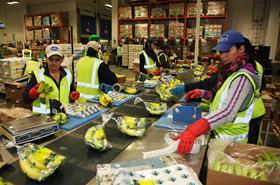
After hitting the fresh produce headlines for the failed merger proposition with US banana giant Chiquita, you could be forgiven for asking ‘what next for Fyffes?’ But the Irish exotics supplier may have a trick or two up its sleeve yet – with a posted UK turnover of £287.2 million, the company says its future growth plans will continue to focus on efficient capital allocation, through “acquisitions and organic growth factors”.
As a listed company, Fyffes says it cannot discuss whether there are alternative mergers or acquisitions in the pipeline, but speaking after Chiquita shareholders finally voted in favour of the rival bid from Brazilian group Cutrale-Safra, Fyffes executive chairman, David McCann, said: “We are confident Fyffes will remain at the forefront of the global produce industry. We will continue to focus on successfully developing our business for the benefit of all stakeholders.”
The company says this year’s turnover was achieved through production, procurement, shipping, ripening, distribution and marketing of bananas, pineapples and melons, from bases in Europe, the US, Central and South America. “Fyffes is unique because of our vast experience, our brand and what it stands for, our world-class levels of expertise, the efficiency and effectiveness of our supply chain and our focus on customer service,” a spokesperson says of the famous blue-sticker brand.
Financially, McCann said Fyffes’ consistent results over the past few years have allowed it to remain the largest banana company in Europe. “Fyffes’ management team has a proven track record of delivering shareholder value, as demonstrated by our consistently strong results in recent years and solid balance sheet,” he said. In its 2013 business report, Fyffes said wider group investments included the purchase of an additional pineapple farm in Costa Rica, adjoining its existing site, meaning the group now produces more than half of all the pineapples it markets. During 2013, the group also completed the purchase of the final 20 per cent of the Sol melon business in the US, which it now owns outright.
In August of this year, amid discussions of the ‘ChiquitaFyffes’ merger, Fyffes announced its group results for the first half of 2014, with growth in both revenue and pre-tax profit. Pre-tax profit stood at €31m (£24.6m), up 40 per cent on last year, while group revenue excluding joint ventures rose three per cent to €490.2m (£388.5m), driven by further organic growth in all product categories, but particularly in pineapples and melons. Fyffes said it was also affected by an €8.3m (£6.6m) exceptional charge from an estimate of professional fees and related costs incurred in connection with the failed Chiquita merger.
“Fyffes has delivered a strong result in the first half of 2014 with adjusted EBITA 36.5 per cent higher,” said McCann. “Based on this result, and continued positive trading conditions early in the second half, Fyffes is increasing its target adjusted EBITA for the full year of 2014 to the range €38m to €42m, compared to €32.7m in 2013.”
Despite going it alone for the foreseeable future, the Fyffes group and its UK business looks more than capable of maintaining its premier position in the global banana industry.



